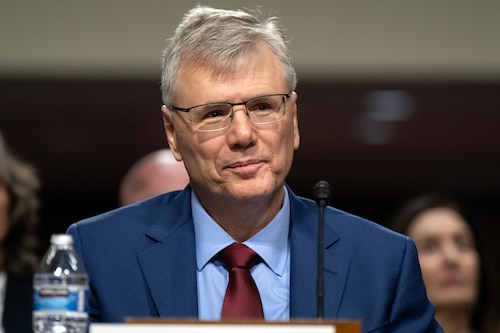Dr. Troy E. Meink, nominated to be the next secretary of the Department of the Air Force, told a Senate committee March 27 that America's "near-peer competitors are evolving faster that we are" and that the Air Force and Space Force must "innovate faster" to meet the challenge.
"The department is building and operating some of the most complex systems ever fielded in both air and space," Meink told the Senate Armed Services Committee during his confirmation hearing. "We need not only the right number of Airmen and Guardians, but also need the right skills, training, support and focus to deliver and operate those systems."
Meink told the committee that his goal, if confirmed, is "to organize, train, and equip the Department of the Air Force to have the lethality needed to deter all potential aggressors, and if necessary, win in conflict."
"A big part of these jobs was understanding the threat I was building systems to have to support against this quickly evolving threat," he said. "These threats have shaped my perspective."
That experience has allowed him to identify three "challenges."
The first, he said, is that "near peer competitors, such as China, are evolving faster than we are in some cases, which will eventually result in the U.S. losing technological advantage."
The second is that "some competitors, such as Russia, are fielding highly escalatory, asymmetric capabilities," he said.
Those realities, in his view mean, "Our homeland is increasing put on the defensive from threats such as cyber-attack, unmanned aerial systems and illegal activities at the border."
As is typical for confirmation hearings, Meink offered broad recommendations for his approach and priorities if he becomes the department's highest-ranking civilian leader.
In addition to innovating faster, Meink said he would work to increase competition and expand the industrial base. That is something he has focused on in his current job as the National Reconnaissance Office's principal deputy director.
As part of that focus Meink said he "significantly accelerated delivery of capability and at a lower cost. I intend to bring that same drive for innovation to the department."
He agreed that maintaining space superiority is a priority. He underscored the importance of the nuclear deterrent and modernizing the land-based leg.
Like his predecessors, Meink said he will draw on his deep experience to bring speed and efficiency to the often-lumbering acquisition effort. "We need to streamline the acquisition and budgeting processes," he told the committee, adding, "with appropriate fiscal controls. I've helped lead my current organization to 16 clean financial audits which I believe is a record in the national security enterprise."
He also told senators that his deep history in senior national security positions shapes will shape his approach in the leading the department.
If confirmed, Meink will come to the office with a wealth of experience. A native of South Dakota, Meink entered the Air Force through ROTC in 1988 while a student at South Dakota State University. He graduated with a degree in mechanical engineering and later, earned a doctorate in aeronautical and astronautical engineering from Ohio State University.
Before serving in his current job, Meink was the Geospatial Intelligence Systems Acquisitions director at the National Reconnaissance Office.
He has logged time as a KC-135 navigator and instructor and as a lead test engineer for the design and evaluation of ballistic missile test vehicles for the Missile Defense Agency.
Across his time with the department and the Pentagon, Meink has managed multiple next generation joint research and development programs transitioning global space capabilities, optical sensors, and advanced structures. He has also led multiple communications organizations within the Air Force and the Office of the Assistant Secretary of Defense, Networks and Information Integration.







